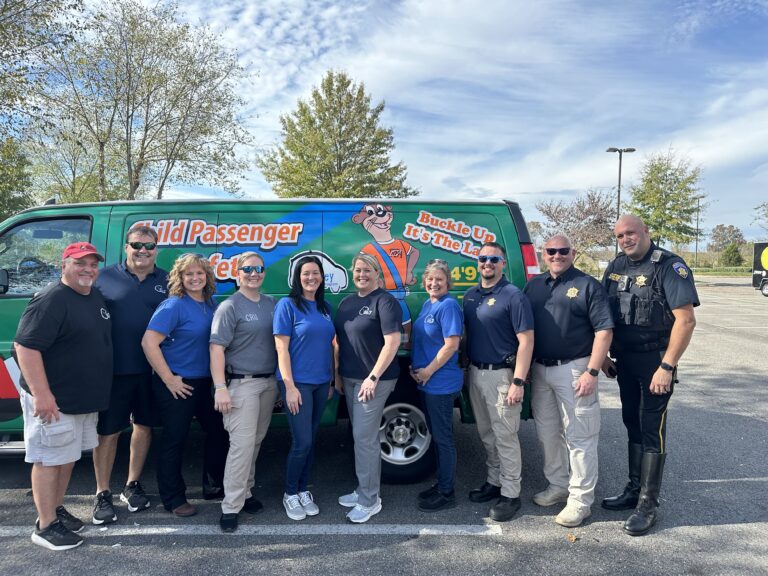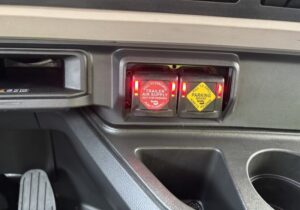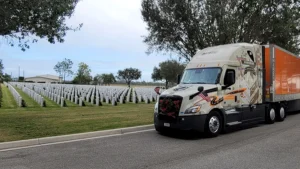WASHINGTON — The Trucking Cares Foundation and the Tennessee Trucking Foundation have each donated $5,000 to help purchase car seats for parents and guardians in Tennessee who are unable to afford them; the combined $10,000 donation for the second straight year to the Ollie Otter Booster Seat and Seat Belt Safety Program will provide up to 200 car seats or booster seats to Tennessee kids.
“Whenever Tennessee parents hit the road, we want them to be able to have the peace of mind that their most precious cargo—their child—is properly buckled in,” said John Lynch, president of the Trucking Cares Foundation. “Through this donation, we hope to make children safer by replacing old, damaged or ill-fitting car seats. We are proud to partner with the Ollie Otter program, which can help parents and caregivers break through the confusion of seatbelt configurations and properly match the best car seat or booster seat with their child. This mission aligns with the Trucking Cares Foundation’s objective to harness the power of the ATA Federation to help others while also promoting highway safety.”
According to a TCF press release, some of the car seats purchased by TCF and TTF were given to eligible families at an event held last month at the 2024 Community Safety Fest in Bradley County, Tenn. The event included car seat safety checks and other safety awareness programs.
“Our mission is to advance highway safety, with one of the key ways being ensuring every family has access to properly fitted car seats, creating safer roads for our children,” said Donna England, president & CEO of Tennessee Trucking Association & Executive Vice President of Tennessee Trucking Foundation. “Through our partnerships with the Tennessee Highway Safety Office and the Ollie Otter Program, we are dedicated to providing the necessary resources to protect young travelers. Together, we can build a future where every child in Tennessee travels safely.”
In 2021, 710 children were killed in passenger vehicles, and more than 100,000 were injured, according to the release. More than a third of the children who died were unrestrained. The current car seat misuse rate of caregivers in Tennessee is close to 80%. In other words, 8 out of 10 car seats used or installed are not following the manufacturer’s instructions and may not perform as intended in the event of a crash.
“The generous donation and support from TCF and TTF will provide the right car seat to hundreds of children in Tennessee. When families meet with a trained CPS tech, they will get the correct car seat and learn the basic steps to making sure their kids are fitting it right, at no cost because of the support from the Trucking Cares Foundation,” said Julie Brewer, a TN CPS State Coordinator who works closely with the Ollie Otter school program and the CPS Fitting Stations, getting resources to the communities where they are needed most.
The Ollie Otter program helps connect kids and families to the local resources that can help kids ride safely. The mascot’s statewide presence has ensured safety is on the mind of passengers and drivers alike. Kids learn what seat is right for them when Ollie visits their school, which may lead the family to seek help to get that seat. Official Ollie Otter School Kits provided to classrooms are filled with information such as where to find local resources such as TN CPS Fitting Stations.
The TN Highway Safety Office has organized a network of Fitting Stations to provide education and guidance on correct car seat fit and installation so caregivers can feel confident that they are keeping their kids safe as they travel. The funds donated to the Ollie Otter Child Safety Foundation provide those Fitting Stations and trained child passenger safety technicians (CPSTs) the ability to replace car seats that are dangerous or don’t fit the child well. In some cases, CPSTs provide a seat to a child who doesn’t have a seat at all.
When a caregiver meets with a CPST, they are provided hands-on guidance on how to use the car seat as the manufacturer intends. A CPST will go step by step through the process to help the caregiver learn how to use the car seat correctly, so parents can do it on their own in the future













